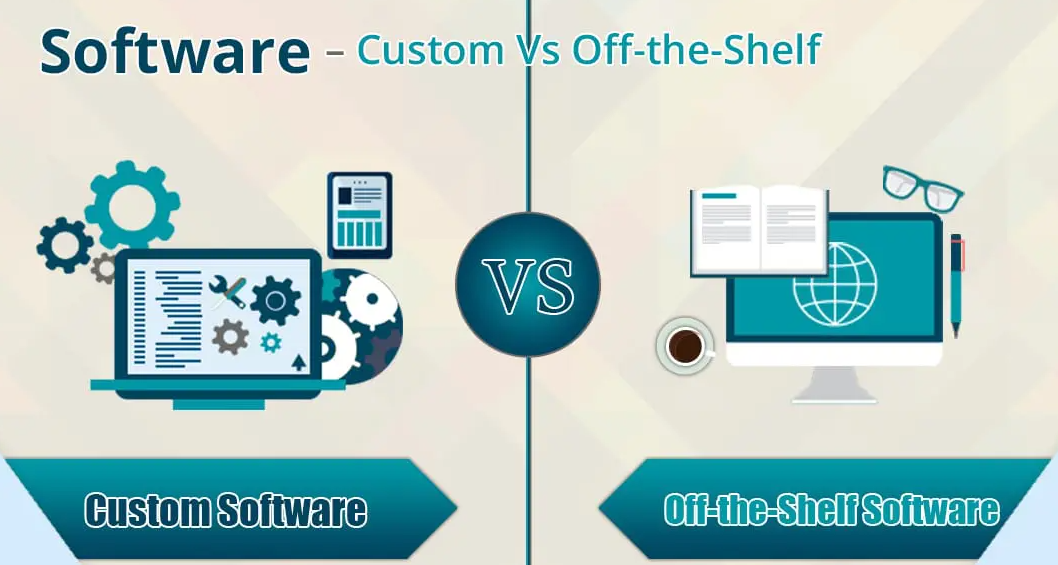Exploring the Contrasts Between 0ff-the-Shelf Solutions and Custom Software
In the realm of software solutions, the choice between custom-built and off-the-shelf solutions is a critical decision for businesses and individuals alike. Each option comes with its own set of advantages and limitations, catering to different needs and preferences. Understanding the disparities between custom software and off-the-shelf solutions is fundamental in making informed decisions about which direction to take.
Table of Contents
TogglePart 1: Custom Software
Custom software refers to tailor-made applications designed and developed to address specific needs of an individual or organization. Here, the software is built from scratch, meticulously crafted to meet unique requirements, workflows, and business processes. This bespoke approach allows for granular control over features, integrations, and scalability, offering a highly personalized Self solution.
Security and Control:
Custom software offers enhanced security measures, as it’s designed with your specific security needs in mind. With control over the development process, you can implement robust security protocols tailored to your data protection requirements. This level of control minimizes vulnerabilities that might exist in off-the-shelf solutions due to their widespread usage and standardized nature.
Benefits of Custom Software:
1. Tailored to Precise Needs: Custom software is designed to fit the exact requirements of the user. This means it can accommodate specific workflows and functionalities that off-the-shelf solutions might lack.
2. Scalability and Flexibility: As businesses evolve, custom software can be easily adapted and scaled to accommodate growth and changing needs without the constraints of pre-existing structures.
3. Enhanced Integration: Seamless integration with existing systems and technologies is possible, optimizing processes and enhancing overall efficiency.
4. Long-term Cost Efficiency: While initial development costs might be higher, in the long run, custom software often proves to be more cost-effective due to reduced need for additional licenses or features.
Part 2: Off-the- Shelf Solutions
Off-the-shelf software, on the other hand, refers to pre-packaged applications available in the market, ready for purchase and use by multiple users or businesses. These solutions are developed to cater to general needs and are not tailored to specific individual Self solution requirements.
Advantages of Off-the-Shelf Solutions:
1. Immediate Availability: These solutions are readily available, requiring minimal setup time. Users can start using them almost instantly after purchase.
2. Cost-effectiveness for Basic Needs: For standard functionalities, off-the- shelf solutions can be cost-effective due to shared development and maintenance costs across multiple users.
3. Vendor Support and Updates: Generally, these solutions come with vendor support, including regular updates, maintenance, and troubleshooting Self solution assistance.
4. Tested and Established: Off-the-shelf software is often tested extensively in various environments, ensuring stability and reliability .Ease of Implementation: Off-the-shelf solutions often come with easy-to-follow instructions for installation and implementation. They are designed for a broader user base, which simplifies the setup process even for
users with limited technical expertise.
5.Additional Considerations: Regulatory Compliance: Industries like healthcare, finance,
and government sectors often have stringent regulatory requirements. Custom software allows for direct compliance integration, ensuring that the software meets specific industry standards, whereas off-the-shelf solutions might need additional customization to adhere to these regulations.
6.Regulatory Compliance: Industries like healthcare, finance, and government sectors often have stringent regulatory requirements. Custom software allows for direct compliance integration, ensuring that the software meets specific industry standards, whereas off-the-shelf solutions might need additional customization to adhere to these regulations.
7.User Training and Adaptation: Custom software can be tailored to mimic existing workflows, reducing the learning curve for users. Off-the-shelf solutions might require more adaptation from users accustomed to a different interface or functionality
Choosing Between Custom Software and Off-the-Shelf Solutions
The decision between custom and off-the- shelf solutions depends on several factors:
1. Specific Needs: If your requirements are unique and specific, Self solution or custom software might be the ideal choice.
2. Budget and Timeframe: Consider the resources available in terms of time and budget. Custom solutions usually require more time and investment.
3. Scalability and Flexibility: If your needs are likely to evolve or if scalability is crucial, custom software might be more Self solution suitable.
4. Support and Maintenance: Assess the level of support and maintenance required. Off-the-shelf solutions often come with vendor support, while custom software might need dedicated maintenance.
conclusion
Both custom software and off-the-shelf solutions have their merits and limitations. Understanding your unique requirements and assessing factors like Self solution scalability, budget, and support will aid in making the right choice for your software needs. Whether opting for tailored precision or immediate functionality, the decision ultimately hinges on aligning the software solution with your specific objectives and long-term goals.

